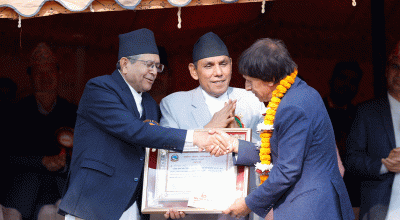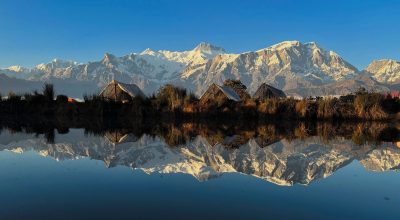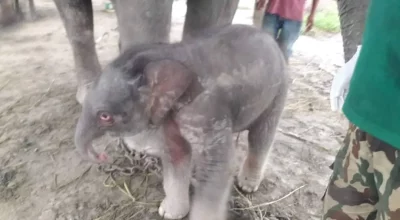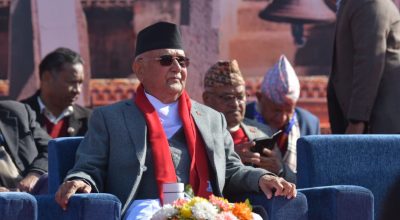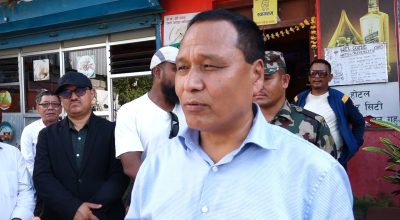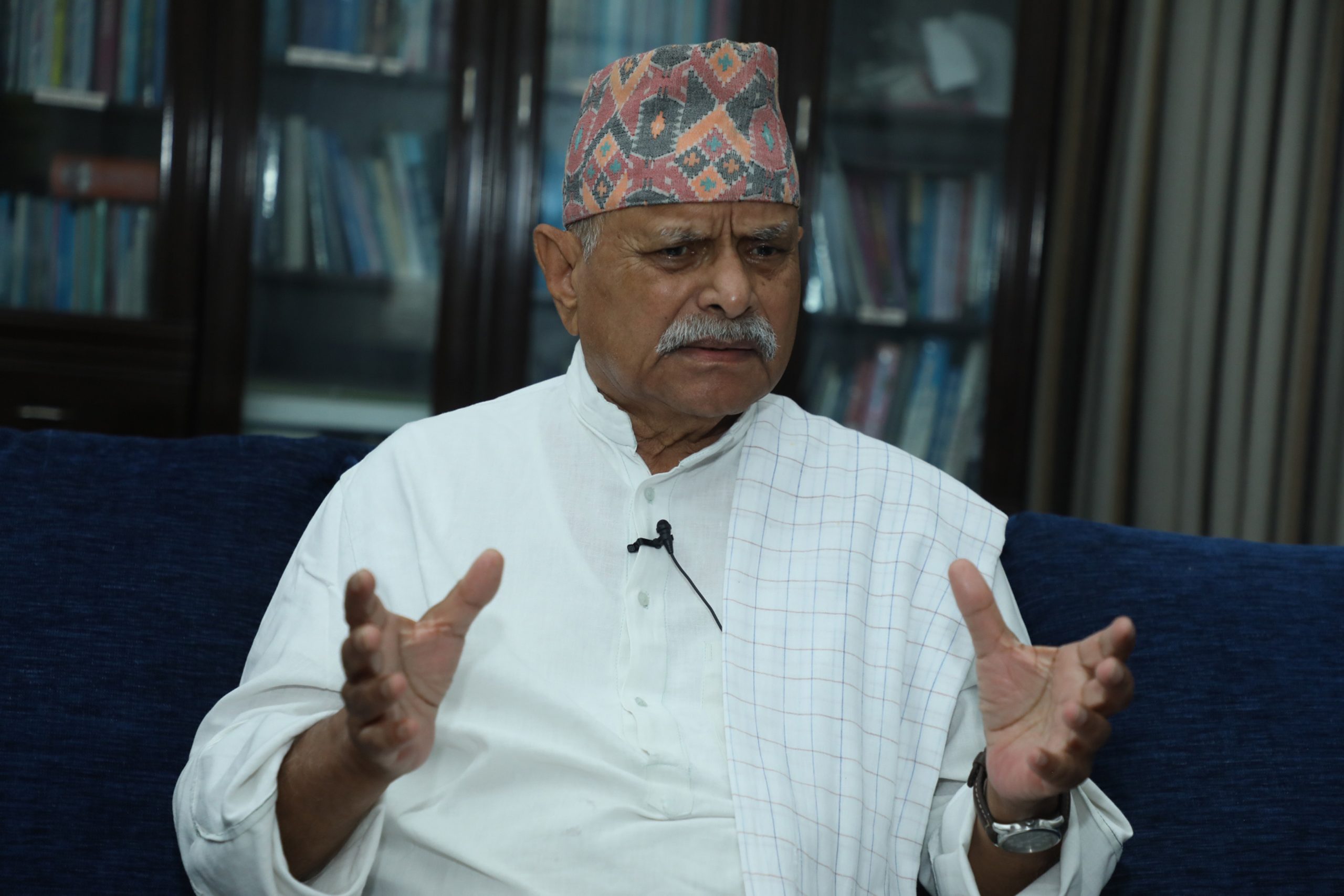
Dr Ram Baran Yadav, the first president of the federal democratic republic Nepal, has called for moving ahead with caution and without deviating from the main spirit of the constitution for its effective implementation as it, issued through the Constituent Assembly, is the main path to democracy. He has expressed the hope that any challenges facing the republic would be cut through, as political parties and citizens are much aware about safeguarding the inclusive constitution and democracy achieved through a long struggle and sacrifices of Nepali people.
“Democracy we are now practicing is beautiful and appropriate. This constitution is the main way to democracy. We all democracy practitioners should not deviate from the main path. We must be cautious,” he said. On 23 November, 2006, the Comprehensive Peace Accord was reached between then the seven political parties and CPN (Maoist), ending the decade-long insurgency in the country. As per the agreement both the parties consented to manage the conflict while organising the Constituent Assembly (CA) election, and issuing the interim constitution for the time being.
Accordingly, the historic CA election was held on 10 April, 2008 and a republic was declared on 28 May, 2008 through the first CA meeting ending the 240 years Shah Dynasty monarchy. Dr Yadav was elected the first president of Nepal through the presidential election following the announcement of an end to the monarchy. Yadav belonging to the middle-class family in the Tarai-Madhes has made invaluable contribution to the democratic movements of Nepal.
As a guardian of the country and taking the role of a civil society leader, he has been closely observing incidents and events taking place in the country alongside the implementation of the constitution and federalism. On the occasion of the Republic Day, Narayan Neupane and Bhishma Raj Ojha of Rastriya Samachar Samiti caught up with Dr Yadav about the burning issues and events of the country. Excerpts:
How are your days going nowadays?
Diseases and problems that come with old age pose challenges. I fell ill for some months after relieving myself of the responsibility as president of the country. I got medical treatment. Now, I am okay. There is a daily routine in my life. I am suffering from a stomach disease, diabetes and blood pressure. I wake up at 5 am, walk and do exercise regularly.
How do you observe the political practice in one and a half decades into the declaration of the federal democratic republic Nepal?
There is a long history of struggle for people’s rights. The happiest part is that we have reached thus far by issuing the constitution from the CA following changes through movements in 2007 BS, 2046 BS and 2062/63 BS and a long transition. Positive side is that the federal, provincial and local elections took place twice after the issuance of the constitution. Power sharing is being gradually institutionalised as per rules and laws.
There is proportional and inclusive representation at all three levels including the local level as per the spirit of the constitution. There is religious, racial and communal diversity in the country. This is a positive part that all of them are brought along in democracy. However, something remains to be settled, and economic discipline has yet to be maintained. In democracy, people should be given space. This constitution is a main way to democracy. This is a happy part that political parties with intelligence and blessings from people timely promulgated the constitution. All forces have embraced this practice. People have been educated and are aware. Laws are made from the parliament, and the central government manages employees at the local level.
Major political parties should accord a ‘special’ focus on the full implementation of the constitution. There are anomalies and overspending taking place during elections. We move ahead by correcting shortcomings surfaced in course of exercising this practice. Successful implementation of the constitution depends on the implementers. As the constitution of Nepal is democratic, republic, inclusive and proportional, the responsibility of its implementation falls on political parties and the civil society should play the role of watchdog.
Whose role is essential in the society to further strengthen republic?
In the parliamentary system, the executive, legislature and judiciary function based on separation of powers. The government should be accountable to the parliament as per laws and procedures. Take an example of the United Kingdom, what problems are surfaced are resolved through the parliament there.
In Nepal, there are efforts to obstruct the parliament. In the parliamentary system, citizens are sovereign. The belief is that people’s representatives should resolve country’s problems all by themselves. The government is always accountable to the parliament.
Now, there is a new parliament. Extensive deliberations on issues are ongoing more than before. People have been educated through deliberations and dialogue in the parliament. There is a room for reforms. Discussions and dialogues conclude any issue. Similarly, the court should be let function freely and impartially. All three bodies, executive, legislature and judiciary, have their own jurisdiction and peripheries. All of them fulfill their work and responsibilities within their spheres.
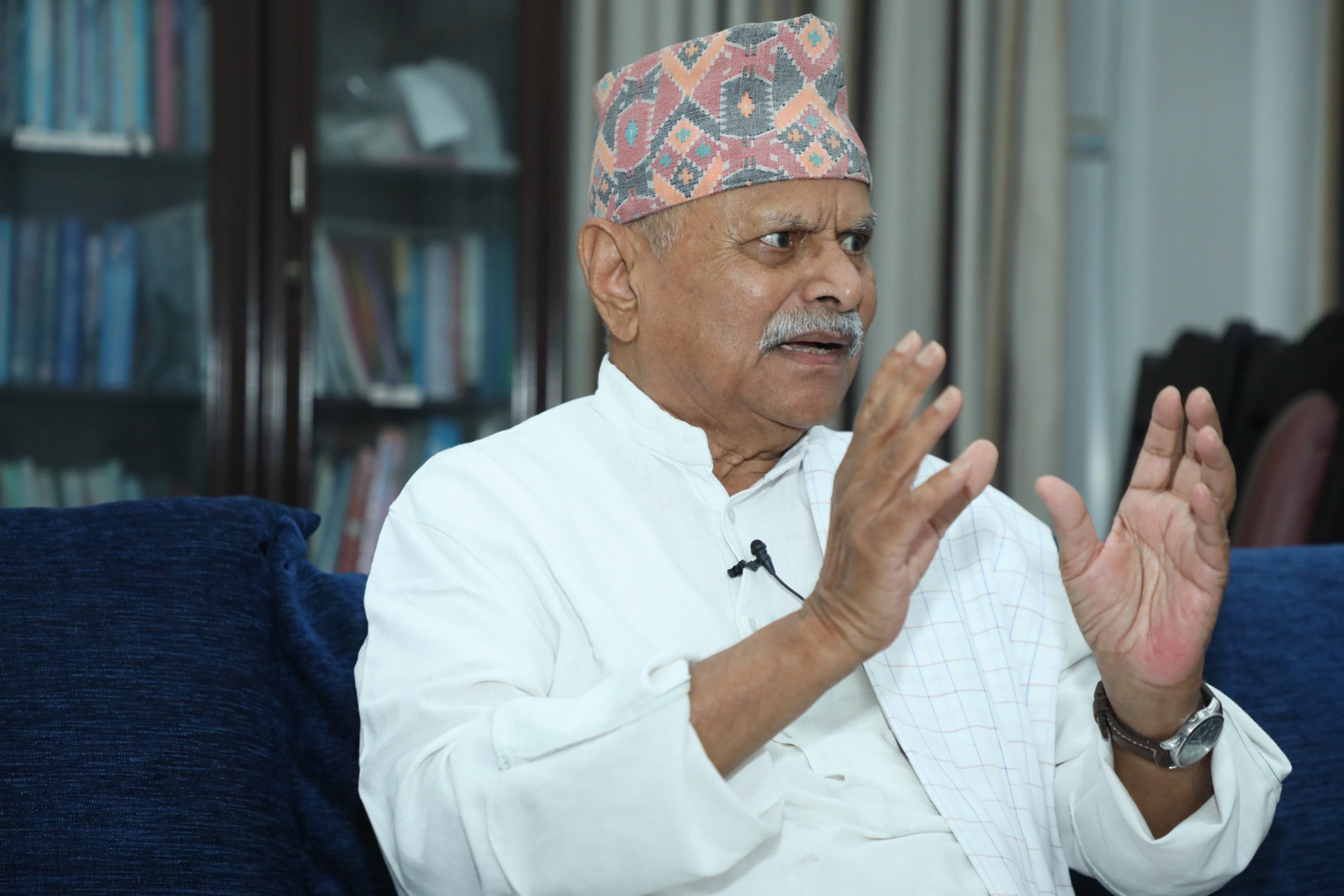
There is an ill practice of making appointments as per power sharing instead of making appointments based on merits. In the parliamentary system, such bad practices will get corrected under people’s pressure.
How have you evaluated the time before and after the declaration of republic in the country?
Comparatively, there are reforms in the representation from various ethnic communities and geography in the society following the establishment of republic. The responsibility of the government and political parties is to manage and make federalism effective instead of terming it costly.
Elections are costly. Good persons, who have contributed to the state, are yet to be at the helm of the governance system. Such anomalies should be removed. Now, our economy is weak. We have yet to accord priorities to agriculture, tourism and industrial sectors despite Nepal being beautiful.
Sustaining the country’s economy through only remittances means there are some shortcomings anywhere. A way out should be sought after holding discussions with experts in various sectors in the society. Relations with neighbours should be expanded while maintaining a unity and integrity in the country.
How do you observe the part of facilities and rights entitled to general people following the establishment of republic?
The country faced challenges of various sorts shortly following the establishment of republic and the issuance of the constitution of Nepal. In between, disasters like the COVID-19 pandemic and the devastating earthquake struck. Internationally, wars between countries and inflation are taking place. So, there is increasing poverty in the world. In this situation, there are difficulties for people’s livelihoods. However, there are big changes in roads, technology, education, health, transport and communications in Nepal. In the democratic system, people have right to freedom of expression. Laws have been made, which can address voices of all, despite failure to bring Dalit and backward class and communities onboard all sectors even now. Main responsibility of the governments of the three levels is to address problems and demands of people. Some work has taken place albeit not much as expected. Results will be gradually achieved in the democratic system.
Persons at the responsible positions of the country are found to have got their connection with the fake Bhutanese refugee scam, and how do you see the incident of their felicitation in the western part of the country while investigations into the case are underway?
It seems anomalies have taken place at the hand of the persons who are at the helm of the positions to make and implement laws. This has tarnished the image of Nepal in the national and international levels. Such incidents sometimes took place in the state due to wrong people. Perpetrators should face action as per the constitution.
People are always vigilant about whether or not people’s representatives have discharged their duty with discipline. This is a democracy. You can see protests against the incident at the streets of Kathmandu and across the country and in media. No one should affect investigations when such incidents take place. If there are any efforts of obstruction, people’s vigilance does create pressure. People’s wish is that the case should conclude soon, and cent per cent people involved face action. It can be positive if 90 per cent of the accomplices are punished. The rest will get automatically scared out of their wits. In the democratic system, results take place gradually.
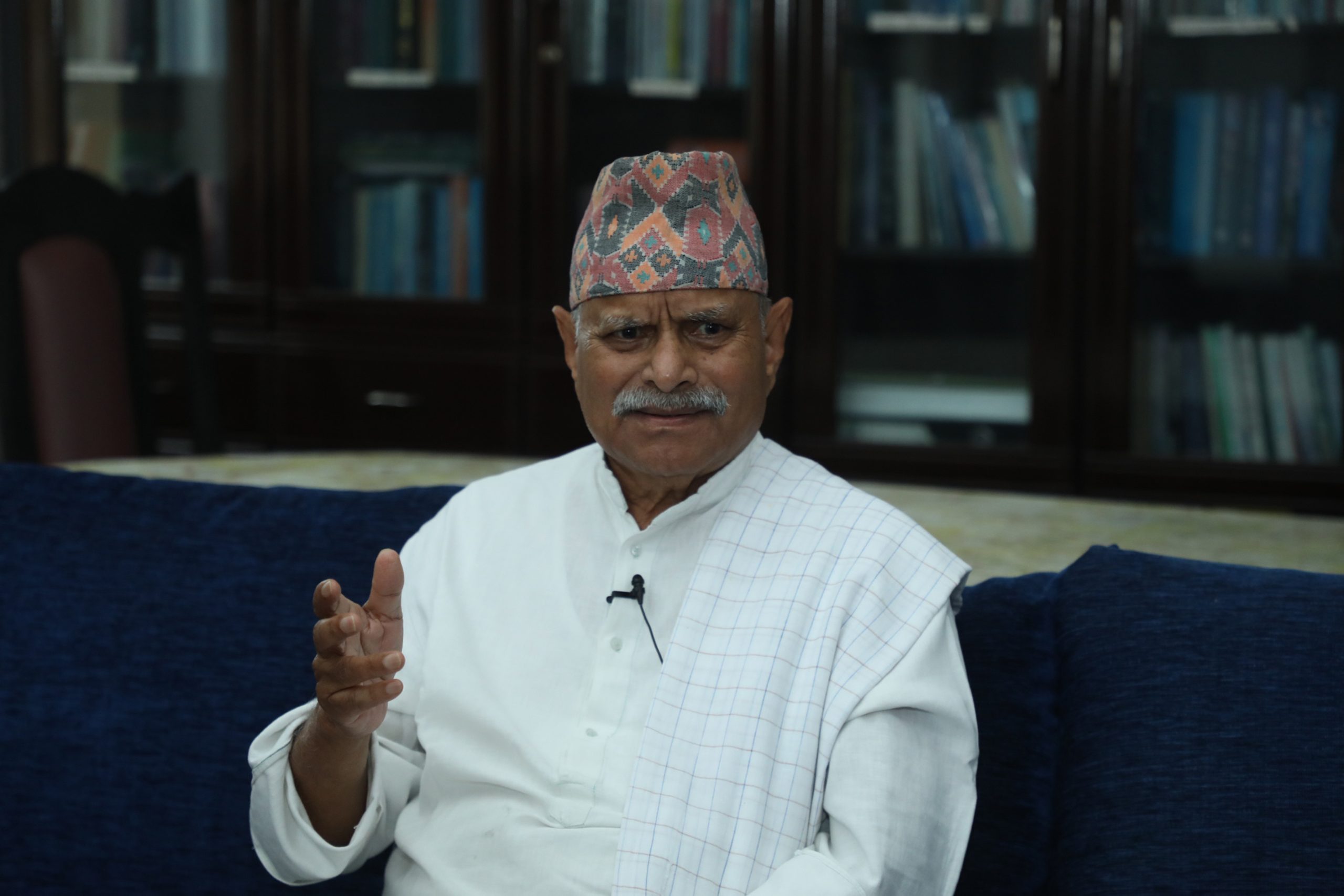
On the felicitation things, there are still traditional forces in the world. For an instance, cadres of Hitler in Germany are still raising their heads. There is a vibrant democracy in the United States. However, sometimes what sorts of people have been elected? We can see.
Such forces can try to perplex people by raising the issue of religion in any countries. We should not panic and deviate when such things take place. In the context that even the force that took up arms with the intention to divide the country has been onboard the democratic system, there is no relevance to bring old extreme forces to popularity by unnecessarily giving them importance. People have been well-educated. In the democratic system, political parties should deliver with discipline. There is no worry about other issues.
Lately, concerns have been raised that federalism or the system of province are being costly; the country cannot bear it. How do you see it?
Federalism has been established to maintain unity by accommodating our diversity. It is too early to evaluate how far federalism has become successful just eight years into its practice. There will be efforts of all of us for its successful implementation. Required laws for all three levels should be made. There should be a synchronisation. People have accepted the system as it is for their welfare despite it being costly. Anomalies surrounding the system should decrease. It appears people, be them from mountain, hill, Tarai and far-flung area, have not questioned the practice of federalism anytime anywhere. Focus should be on what sort of laws are required for its implementation as per the constitution.
How do you evaluate the practice of republic, democracy and federalism in Nepal and in the international level?
There are both positive and negative parts of any issue in the world. In the 21st century, we are moving ahead by having experiences from global incidents and events. There is not any alternative to this system. What governance system should be brought after democracy! Democracy and republic have been brought in Nepal through successful movements in the past. We are practicing the democratic system that has been adopted by the civilized society and countries in the world. An alternative to democracy is only reformed democracy. Now, we can make it more inclusive. We have brought the parliamentary system with democratic republic. This is inclusive and proportional where all religions, communities and classes have been brought along.
This is a big achievement. This is prosperous. There is urgency for the Prime Minister, executive chief of the country who has taken up the main responsibility to run the country, to strengthen and implement this system. There is not any sort of its effective implementation felt. There is a tendency that the government negligently makes appointments based on nepotism instead of merits in education, health and administration sectors. Such malpractice should be removed.
What is the role of president in establishing this political system and strengthening democracy?
President is considered to be a protector and patron of the constitution, and a symbol of unity and the country’s guardian. Earlier, two persons got the opportunity to take up the role of president. I delivered out of my capacity within the jurisdiction of the constitution during the transitional period.
I feel I played a role at maximum to save democracy during the transitional phase and when the peace process was in its preliminary phase. Then, political parties could not elect the common Prime Minister, and the court set the timeline of the CA. The situation was like political parties could not promulgate the constitution. Weakness of the political parties hit the Office of President. So, then Chief Justice was given the responsibility to organise CA election. CA election was held after then Chief Justice was elected Chairperson of the CA amid challenges. People’s participation was encouraging. The CA election paved the way for all forces to come together to create an environment conducive to promulgate the constitution. Was that not a happy part! When the country got the second president, time changed a lot, and people were well-educated and aware. Now, Ramchandra Ji was recently elected president. He has a long history of politics. President should stay alert about the protection of the constitution. I hope he has that sort of alertness.
There are suggestions that it may be appropriate time for the former president to serve to patients at government hospitals in the capacity of the country’s renowned medical doctor. What is your view about it?
People’s suggestion for me is right. Actually, I fell ill after being free of the responsibility as president. I went through a surgery. I was on regular treatment for long. I got my some years spent during my treatment. Now, I am suffering from a stomach disease. I have to eat and sleep timely, and do exercise regularly.
My body does not allow me to work. I cannot attend to patients in my condition. It is a public fact that I regularly did my duty up to 12 hours a day when my health allowed. You can ask any residents of Janakpur about this. I honour people’s wishes.
Do you have any suggestions or messages to Nepali people on the occasion of the Republic Day?
We have such as democracy that there is a vibrant media; people are well-aware, and even general people can get information about where irregularities and wrongdoings are taking place. People should be aware to get democracy being strengthened. There is a situation where thousands of people including women from Dalit, Madhesh and indigenous communities and other communities have been elected at the local level following the adoption of inclusion. A ship of democracy carrying all people onboard can safely reach its destination at the right time despite turbulences on the way.
Now, people are aware. They can cut through any challenges. Democracy we are now practicing is beautiful and is the right-type. Constitution is a path to democracy. This should not deviate from the main path. We must move ahead with caution. (RSS)






